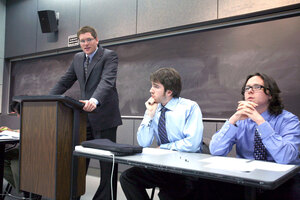College Democrats, Republicans square off at debate
Political debate was in full swing Wednesday night as students filled the room in Waite Phillips Hall to hear campus political groups debate President Obama’s terrorism policy.

Resolved · Rob McCarthy (left), a member of College Republicans, speaks at Wednesday’s debate as Jonathan Brebner and Fritz Pielstick (right) of College Democrats consider his argument. - Candice Harbour | Daily Trojan
The fourth such policy debate between the USC College Republicans and USC College Democrats, the event was sponsored by the Trojan Debate Squad, the Annenberg School for Communication & Journalism and the Jesse M. Unruh Institute of Politics; it focused on evaluating Obama’s approach to terrorism.
Republicans argued that Obama’s policy had been ineffective in combating terrorism, while the Democrats took the opposite stance.
Taking the side that the president needed to take a stronger approach in combating terrorism, College Republicans member Rob McCarthy said Obama was too concerned with his political image, rather than national security.
“Until President Obama decides to be practical, his inefficiency will lead to future attacks,” he said.
College Democrats debater Jonathan Brebner argued that Obama’s strategy has not been inefficient and emphasized that U.S. policy does not exist in a vacuum.
“America is safer when people hate us less,” he said. “This is something that can’t be said enough and has to be hammered home.”
Fritz Pielstick of College Democrats agreed, saying Obama’s approach, though not ideal, was an improvement over the previous administration.
“The simple fact of the matter is the fact that Obama has decreased anti-American sentiment has put us in a better situation than we were, if not a perfect situation,” he said.
But Sammy Goldenberg, also a member of College Republicans, dismissed arguments that anti-American sentiment led to terrorism.
“Obama’s attempts at reconciliation have not quelled the terrorist fury against us in the least,” he said, citing recent incidents like the Ft. Hood shooting and attempted Christmas Day bombing. “It is not true that treating our enemy with kid gloves will somehow make them hate us less, nor should we have to worry about angering those who already want to destroy us.”
Debate between the panelists remained calm for the most part, with the exception of a few brief bouts of “I didn’t say that!” and “Yes, you did!” retorts during cross-examination.
Audience reaction was more heated. In addition to mixed laughter and boos during comments, question and answer sessions featured sparring between audience members and panelists.
Some listeners thought the back-and-forth detracted from the debate.
“It could have been more constructive than people talking past each other,” said Catherine Sullivan, a junior majoring in philosophy (ethics, law and value theory) and political science.
Neftalie Williams, a junior majoring in communication, agreed.
“The audience got a little too heated without getting points across,” he said.
As in previous debates, audience members voted to determine a winner. But this year, for the first time, the debate included a judge, Dr. Jeffrey Sellers, an associate professor of political science at USC.
Upon the conclusion of the debate, Sellers called both sides’ arguments underwhelming.
“In my role as Simon Cowell here, I will try to set the record straight,” Sellers said. “I hope everyone is equally dissatisfied.”
He said both parties got hung up on weaker arguments during questioning but gave a marginal edge to the Democrats.
“My overall conclusion about the merits is that the Democrats were not actually able to establish that the Obama administration is effective, but that they were able to establish that it was less ineffective than the Bush administration,” Sellers said.
Nick Bradvica, a freshman majoring in creative writing, political science and social sciences (economics) who represented the GOP in the last debate, spoke more highly of the outcome.
“I thought both debaters on both sides were prepared and argued solid points,” he said.
Bradvica said that although he felt the Republicans did a better job, he wasn’t sure the debate swayed many people’s opinions.
“I think most people don’t change their minds over one hour of debate,” he said.
But Bobby Almeida, the president of the USC Democrats, said he hoped the debate helped bring students to the Democratic side, which he felt did a better job of showcasing the facts.
“I’d assume some people were wishy-washy on the issues,” he said.
Anna Li, a junior majoring in communication who leads the Trojan Debate Squad, spoke more highly of the event, saying it had a higher standard of arguments than previous debates.
“It was really a success because both sides became passionate,” she said.
A debate for next semester is already in the works.
